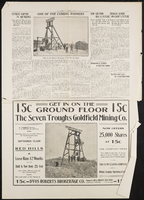Search the Special Collections and Archives Portal
Search Results
MGM Mirage Records on Mandalay Resort Group
Identifier
Abstract
The MGM Mirage Records on Mandalay Resort Group consists of materials from Mandalay Resort Group’s office of public relations and community affairs records, which was closed after Mandalay’s corporate merger with MGM Mirage in 2005. The files, dating from 1968 to 2005, provide documentation of Mandalay Resort Group’s external affairs and internal operations. They contain subject files, photographs, negatives, slides, correspondence, VHS tapes, corporate publications, press releases, press kits, wholesale room agreements, hotel ephemera, employee newsletters, and press clippings. Of particular interest are files and photographs documenting the planning, development, construction, and opening of the Mandalay Resort Group properties.
Archival Collection

Transcript of interview with Frankie Perez by Elsa Lopez and Laurents Bañuelos-Benitez, November 5, 2018
Date
Archival Collection
Description
Frankie Perez (1986- ) is an individual that constantly found himself navigating two worlds, whether it was military versus civilian; female versus male; or being Latinx in the United States. As a result of this navigation, Perez has a unique perspective on our ever more complicated world that not many individuals possess. Perez served in the military during the Do Not Ask, Do Not Tell policy which made it difficult for someone dealing with gender identity, to seek out the proper support they need. Despite the policy, and other policies that were put in place afterwards to inhibit the transgender community in the military, Perez began his transition while still serving his country. In direct contradiction of popular opinion, Perez discovered that the military easily accommodated his transition. Outside of the military Perez is an active voice in the LGBTQ community. As a member of the LGBTQ, Latinx, and military community, Perez has a unique perspective that he uses to fight for both LGBTQ and Latinx rights. Currently, Perez is finishing his degree in gender and sexuality studies at UNLV. He hopes to use his education to help people have the difficult discussions and improve conditions for his communities.
Text
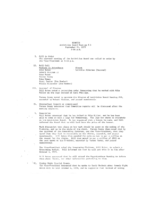
Meeting minutes for Consolidated Student Activities Board, University of Nevada, Las Vegas, September 25, 1978
Date
Archival Collection
Description
Text
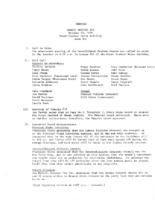
Meeting minutes for Consolidated Student Senate, University of Nevada, Las Vegas, October 10, 1978
Date
Archival Collection
Description
Text
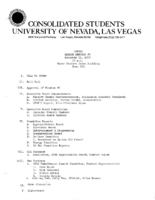
Meeting minutes for Consolidated Student Senate, University of Nevada, Las Vegas, December 21, 1979
Date
Archival Collection
Description
Text
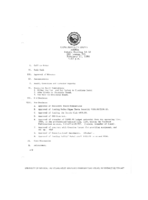
Meeting minutes for Consolidated Student Senate University of Nevada, Las Vegas, Febraury 20, 1986
Date
Archival Collection
Description
Text

Transcript from interview with Rabbi Yocheved Mintz by Barbara Tabach, March 11, 2015
Date
Archival Collection
Description
During this oral history, Rabbi Yocheved Mintz weaves the journey of her life before and during her move to Las Vegas. She recalls thinking the "whole world was Jewish" growing up in Cleveland, Ohio, and discusses finding a community in Las Vegas, and becoming a rabbi in 2004.
Yocheved (nee Porath) Mintz is a native of Cleveland, Ohio, where she grew up surrounded by Jewish tradition and teachings. Her grandfather was Rabbi Israel Porath and inspiration to become the family?s first female rabbi. She was ordained in May 2004. The next year she became the second spiritual leader of Valley Outreach Synagogue, now known as P?nai Tikvah. She soon was known as a tireless and inspirational rabbi for the entire Jewish community of Las Vegas. After eleven years, on June 17-18, 2016, Rabbi Mintz?s life and dedication to being Jewish were celebrated. She transitioned to be Rabbi Emerita/Senior Educator. Before moving from Chicago to Las Vegas in 1999 she was abundantly busy with raising four sons she had with her husband the late Dr. Alan Mintz (1938-2007). However, she also managed to pursue her education, become an interior designer, and co-found with her friend Etty Dolgin, a Jewish education consulting firm called Kesher Team. Yet there was a lingering goal to become a rabbi. Throughout her life, Yocheved eagerly studied various approaches to living a Jewish life. So once she had settled into Las Vegas, she began her commute to Los Angeles to study at the Academy for Jewish Religion, a trans-denominational seminary. She interned at Temple Beth Sholom and has been involved in Jewish education locally and nationally. She has served as the first president of the Las Vegas Board of Rabbis and on the Interfaith Council of Southern Nevada.
Text

Jose Leonardo Martinez oral history interview: transcript
Date
Archival Collection
Description
Oral history interview with Jose Leonardo Martinez conducted by Barbara Tabach and Nathalie Martinez on August 19 and 29, 2020 for the Latinx Voices of Southern Nevada Oral History Project. Session 1: Jose discusses his childhood and what it was like growing up during the Salvadoran Civil War. He recounts the dangers he's faced and how he made his way to the United States after traveling through Guatemala and Mexico. Subjects discussed include: Salvadoran Civil War; Ciudad Arce, El Salvador; Guatemala; Mexico; Los Angeles, California. Session 2: Jose continues his discussion of growing up in El Salvador and the violence he witnessed in the country's army during the 1980s. He also talks about his personal life after moving to the United States and his experiences navigating gang culture in Los Angeles, California. Jose recounts his previous jobs, his schooling, how he met his wife, and his family's move to Las Vegas. Subjects discussed include: El Salvador army; gang violence.
Text

Meeting minutes for Consolidated Student Senate University of Nevada, Las Vegas, December 7, 1990
Date
Archival Collection
Description
Text

